The tale of ‘the terrible twosome’ #kickingmyelomasbutt
Their nicknames for each other are Curly and Spikey. They’re also known as the ‘terrible twosome’ and, while they’ve walked the same path since their diagnoses with myeloma, they’ve each had vastly different experiences.
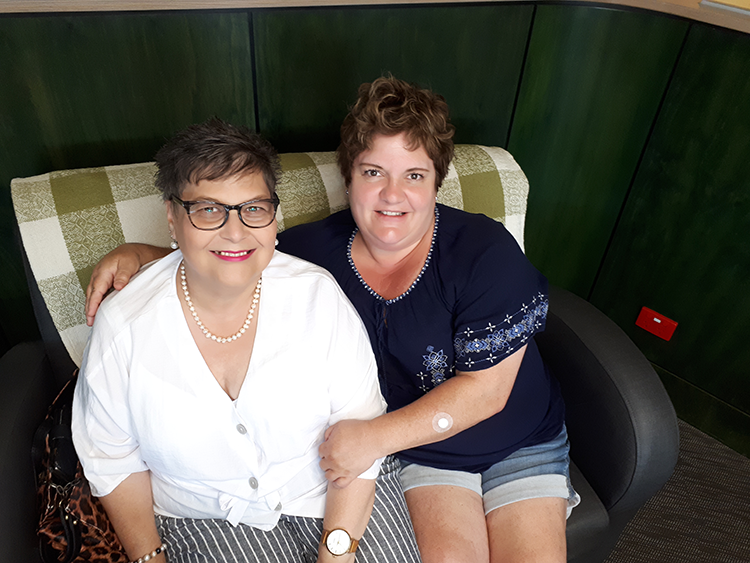
They are one year apart in age, 53 and 54, both are married and have only children – daughters.
One is a theatre nurse at a hospital, the other is a carer at a nursing home. They live in Geelong.
Both were fit, well and asymptomatic until a sudden pain event struck out of the blue. This led to medical appointments, tests and finding out they had blood cancer within two months of each other.
Neither of them had ever heard of myeloma.
They have the same haematologist, both had the VCD* chemotherapy regimen, and their stem cell transplants were scheduled for May 2018.
As neither of them had great veins, they had a vascath [a catheter similar to that used for dialysis] so they could be hooked up to the apheresis unit for their stem cell harvests.
One breezed through her stem cell transplant, describing it as “a piece of cake”. For the other, “everything that could go wrong, did”.
Both achieved a remission, went back to work, and got on with life.
After their transplants, they went on maintenance thalidomide. One continues to take the drug and tolerates it, no worries.
The other took thalidomide for two weeks and got so sick she thought she was going to die, so she’s had no maintenance treatment. She found out the day before speaking to Myeloma News that she may be relapsing and potentially faces a second transplant.
How Kellie met Rita
This story is about Rita Mauri and Kellie Devlin. They’ve become the best of friends since meeting at the Leukaemia Foundation’s Barwon Blood Cancer Support Group at Geelong in April 2018 and have provided support and encouragement to each other since.
“I’m thankful that we’ve got each other,” said Rita, who was at the support group with her daughter, Laura, now aged 26.
“We were in a circle. Everyone was talking about their illness, where they were up to, and how they were feeling,” said Rita.
“Laura spoke about my illness for me, because I was too emotional. I was crying all the time.
“I was frightened of everything, the unknown… what’s going to happen to me, am I going to live or am I going to die.
“I wasn’t going to go. Linda (Saunders, the Blood Cancer Support Coordinator for Barwon South West Region) said come along, because I was crying on the phone with her for a long time. I said okay and I went along and thank god that I did.
“We got talking,” said Rita about meeting Kellie that day.
“Rita was walking with a cane and was really not in a good place,” said Kellie.
“When she asked what I was there for, I said, ‘I’ve got myeloma and I have to have a transplant’. She said, ‘I do too, but I’m not going to have a transplant. I’m too frightened to have it’.
“She was very distressed and polarised with fear, which is understandable. Having a transplant is big and the reality is you may not come home.
“I basically said to her, ‘listen, you’re walking with a stick, you’re hunched over like an old woman, you’re 52 years old. You’re probably stuffed if you don’t have it, you might be stuffed if you do, so it’s probably the lesser evil.
“I said, ‘come on, you’ll be alright. We’ll be in there together, it’ll be fine’,” said Kellie.
“Looking back on it now, I’m very fortunate that Kellie was there with me and a few weeks ahead of me,” said Rita.
“Seeing her go through it put me at ease a little bit and I thought, ‘it’s not that bad after all’.
“Seeing how she coped with it so well, and thinking hopefully, I’ll do the same thing as she did.
“Mine didn’t turn out that well. I had all these hurdles to go over but I’m still here to tell the tale,” said Rita.
Kellie’s story
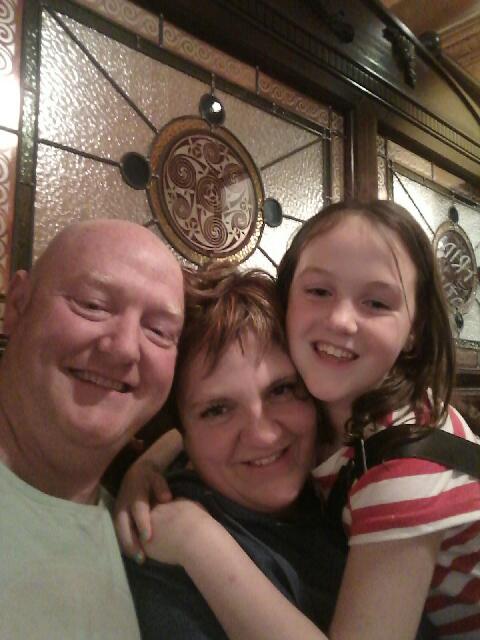
Kellie “had no symptoms and was perfectly well” when she was diagnosed with kappa light chain myeloma on 16 November 2017. She had her transplant six months later, on May 9.
Her myeloma journey began when she got the “most horrific pain” in her leg while getting ready for work one morning.
“Then I lost the feeling in my leg and thought, ‘I’m having a stroke’. It turned out to be a big lesion and my femur was about to snap,” said Kellie.
All her bloods were normal, but a bone marrow biopsy confirmed she had myeloma.
“I only had about 25% infiltration in the marrow which, considering some people have 100%, was pretty good. I was standard risk which was good. I was well which again was good.”
After four cycles of VCD, Kellie “breezed through the transplant”.
“I was out in 15 days, didn’t vomit, nothing. It was a piece of cake really, and I went back to work, and everything has been cruisey.”
Rita’s story
Rita was diagnosed on 10 January 2018 and her story began in early-December 2017. She thought she had gastro and had hurt her back vomiting. She went to an osteopath who put it down to a pinched nerve.
“I persevered for a couple of weeks. Then the pain was so severe I ended up going to the emergency department on Christmas Day,” said Rita.
After a two-week stint in hospital being treated for a renal infection, she went back to the ED on January 10 because “the pain was still so so bad”.
She had more tests, including a light chain test that she didn’t know about.
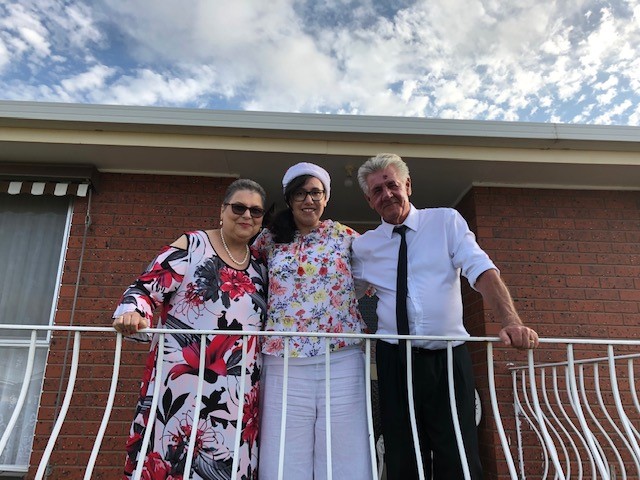
When Rita was told she had myeloma, she was more worried about the pain in her back.
“The pain got to me more than the diagnosis,” said Rita.
“The pain was so severe I didn’t comprehend what was going on. I was in la la land. Everything was a blur. I wasn’t worried about the myeloma at that time.”
She had three fractures in her spine and her light chain reading at 20,000 “was the highest they’d ever seen, she said.
From January to April 2017, Rita was in and out of hospital for her treatment. In May, a blood clot in her neck set her transplant back a week, and when her stem cell harvest produced only 1000 stem cells, it was further delayed.
To ‘float’ her stem cells for a second harvest, Rita was given “an injection which was very expensive – $7000”, which resulted in a bounty of 16,700 stem cells.
She had 6000 of them infused during her transplant on 5 June 2018, and the rest are in storage.
Post–transplant
Straight after her transplant, Rita got colitis and once that was treated she spent another 2½ weeks in rehab.
“I eventually came home in August. It took me a while to get back on my feet. I lost my mobility and had the shakes. I didn’t drive until November and went back to work in February 2019,” said Rita.
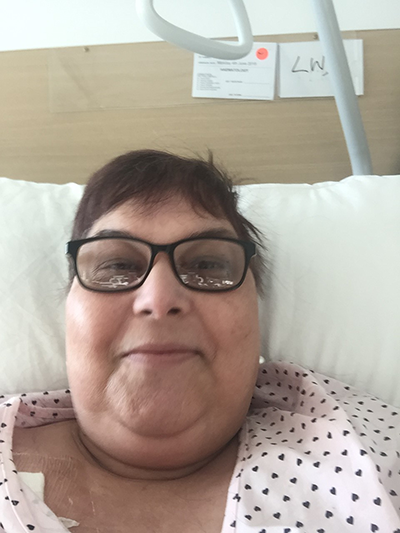
“Kellie was in and out in 2½ weeks for her transplant but I was in hospital for 2½ months. It was bizarre.
“And that’s why we laugh together sometimes – we can’t believe that I was so sick, and she got out of it so lightly.”
When Rita was in rehab regaining her strength, Kellie would visit her and that’s when they gave each other their nicknames.
“My hair came back crazy curly and hers came back all spikey; we were Curly and Spikey,” said Kellie.
“And if we’re at the hospital together, the nurses laugh and say, ‘oh, here they are… the terrible twosome’. We’re a bit of a celebrity in a crazy sort of way,” said Kellie.
Rita described them both as “very similar in character – she’s the same daggy as I am”.
“We get on really well. We go out for coffees and we message each other. We’d like to catch up more often,” said Rita.
“Kellie’s very busy. She has an 11-year old daughter and takes her to basketball, swimming and dancing, and she works a couple of days a week.
“We often go to the doctor together. We have a coffee and talk about the situation we are in,” said Rita.
“It’s amazing to have this person there with you, doing the same thing as what you are, and knowing that she knows what you are going through.
“It’s just the best thing that has ever happened to me,” said Rita.
“We’re walking the same path. We understand each other,” said Kellie.
“I can say, ‘I’m anxious’ and she knows what that means and how it feels. If I say, ‘I feel fantastic’, she knows what that means and how that feels as well, and vice versa.
“I think that’s the common thread with patients with blood cancers if you have a blood buddy. They get what you’re saying when other people don’t,” said Kellie.
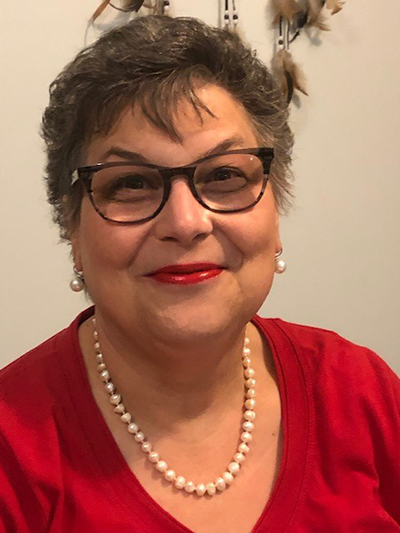
Leukaemia Foundation support
Kellie said the Leukaemia Foundation “does blood cancer really well”.
“The support and the information and everything offered is phenomenal.
“And Linda, honestly, she’s an angel. She’s very sympathetic and empathetic and very kind and helpful,” said Kellie.
Where they are at now
“I’m on thalidomide at the moment – it keeps me in remission,” said Rita.
“I take one day at a time and enjoy the moment.”
“Rita’s gone back to work. She looks amazing and she feels amazing. And I feel amazing, but my bones are clearly telling another story,” said Kellie about the medical results she received in February.
“Rita came with me to the haematologist. My light chains had jumped. When I was told I had tears in my eyes and Rita had tears in her eyes, and it was like ‘golly, here we go’.
“My story now is perhaps going to take a different road, but I’ve got the hashtag, #kickingmyelomasbutt. You can’t focus on the ‘what wills’ and ‘maybes’, just focus on life and keep going.
“I don’t want to sound blasé, and this is going to sound absolutely crazy, but I just didn’t feel death in me [when Kellie was diagnosed] and I just knew… ‘it’s not my time, so bring it on and let me get back to work, and get back with my family, and back to life’.
“And I feel like that now. This is a bump in the road that I’m not particularly happy about but let’s just get it over with, so I can get back on with my life,” said Kellie.
* VCD or CyBorD: bortezomib (Velcade®), cyclophosphamide and dexamethasone.
When this article was published, Kellie had started a second course of treatment – four cycles of lenalidomide (Revlimid®) to be followed by a stem cell transplant, earmarked for late-July 2020.
Last updated on August 6th, 2020
Developed by the Leukaemia Foundation in consultation with people living with a blood cancer, Leukaemia Foundation support staff, haematology nursing staff and/or Australian clinical haematologists. This content is provided for information purposes only and we urge you to always seek advice from a registered health care professional for diagnosis, treatment and answers to your medical questions, including the suitability of a particular therapy, service, product or treatment in your circumstances. The Leukaemia Foundation shall not bear any liability for any person relying on the materials contained on this website.